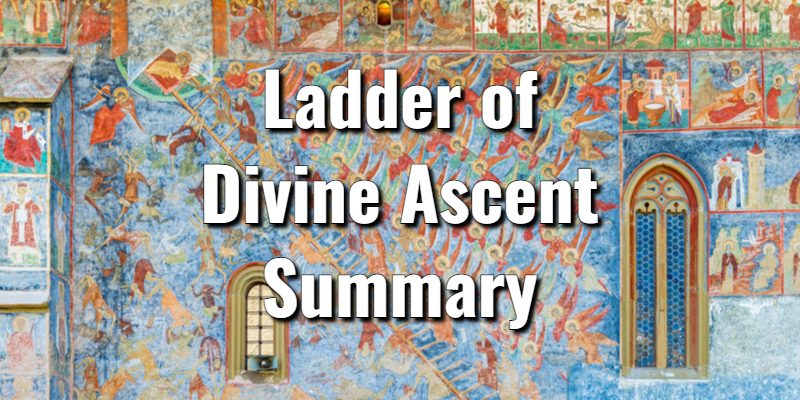Lord’s Library editors created this Ladder of Divine Ascent summary and meaning as a primer before you read the classic work.
The Ladder of Divine Ascent is a classic Orthodox Christian work that uses a ladder as an allegorical representation of the steps in one’s spiritual life. It was written by Saint John Climacus, also known as John of the Ladder, in the seventh century. The book consists of thirty steps or stages that one must ascend in order to reach spiritual enlightenment and thus divine union.
Each step of the ladder represents a specific virtue or vice that individuals encounter in their Christian walk. The steps cover a wide range of topics, including renunciation of worldly attachments, obedience to a spiritual guide, humility, detachment from material possessions, conquering of vices such as anger and envy, and cultivating virtues like faith in the Lord Jesus Christ, love, and prayer.
The ladder begins with the foundational step of renunciation, which involves detaching oneself from worldly concerns and dedicating oneself entirely to God. As one progresses through the steps, they are encouraged to cultivate virtues and overcome vices, leading to the purification of the soul and the attainment of spiritual maturity.
Ladder of Divine Ascent Summary and Meaning
Saint John Climacus emphasizes the importance of humility throughout the ladder, considering it a fundamental virtue that underpins all other virtues. He also stresses the necessity of spiritual guidance and obedience to a spiritual elder or guide who can provide wisdom and insight on the path to spiritual maturity.
The ladder culminates in the final steps of love and prayer, where the soul is said to attain a state of divine communion and union with God. The goal of the ladder is not only personal spiritual perfection but also the attainment of unity with God.
Ladder of Divine Ascent Meaning
The Ladder of Divine Ascent has been widely read and studied by both monastics and laymen. In this curation, Lord’s Library editors want to point out five key aspects to consider while reading this Ladder of Divine Ascent summary:
It Emphasizes the Concept of Spiritual Warfare
Saint John Climacus describes the spiritual journey as a battle against the forces of evil, both external and internal. He discusses the strategies and tactics employed by spiritual adversaries, such as demons and temptations, and provides guidance on how to overcome them through prayer, vigilance, and reliance on God’s grace.
It Highlights the Significance of Repentance
Saint John emphasizes the importance of recognizing and confessing one’s sins as a vital step toward spiritual growth. He encourages individuals to humbly acknowledge their shortcomings, seek forgiveness, and strive for sincere repentance.
It Underscores the Value of Communal Living
While the focus is on personal spiritual progress, Saint John acknowledges the benefits of living in a community of like-minded individuals pursuing similar goals. He discusses the dynamics of communal life, the challenges that arise, and the mutual support and accountability that can be found within the Christian community.
It Acknowledges the Possibility of Setbacks and the Need for Perseverance
Saint John recognizes that the spiritual journey is not always smooth and that individuals may experience setbacks and succumb to temptations along the way. However, he encourages readers to persevere, seek forgiveness, and continue ascending the ladder, relying on God’s mercy and grace.
It Promotes the Practice of Discernment
Saint John emphasizes the importance of discernment in navigating the spiritual path. He encourages individuals to cultivate self-awareness, discern the movements of their own thoughts and desires, and seek wise counsel to make sound decisions and avoid spiritual pitfalls.
We believe these additional points help to further enrich the Ladder of Divine Ascent summary, providing a broader understanding of its teachings and significance in the context of spiritual development. In sum, this classic work houses various Christian meanings, all aimed at inspiring and practically guiding readers to pursue spiritual growth in the Lord Jesus Christ.
Lord's Library is a Christian resource hub. Our editors use a variety of internet research methods like search engines, audio and video, AI, consultations with ministry leaders in the field, and more. Lord's Library should never be a substitute for reading your Bible daily as the Scriptures are to be our final authority on all matters. Lord's Library participates in affiliate programs. We may make a small commission from products purchased through this resource.
- What Does the Bible Say About Achievements? With Key Scriptures - April 11, 2025
- What does the Bible Say About Abortion? With Key Scriptures - April 11, 2025
- Prosperity Gospel Meaning in the Scriptures: Is it Biblical? - April 7, 2025















